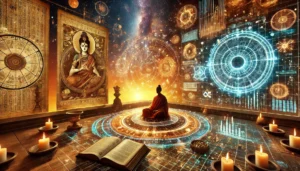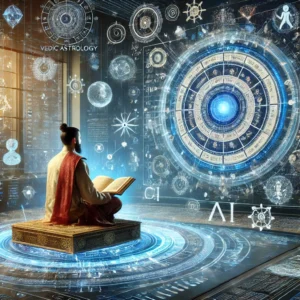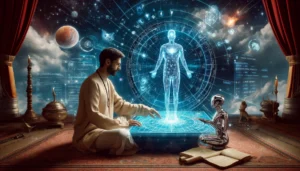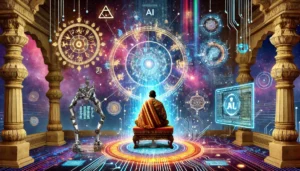
future of astrology with AI
Vedic Astrology Meets AI: Enhancing Accuracy in Astrology and Horoscopes
Vedic astrology, rooted in the ancient texts of the Vedas, has offered profound insights into human existence for millennia. It is a system of divination that connects the movements of celestial bodies to life events, aiming to provide guidance on everything from relationships to career paths. Traditionally, it relied on expert astrologers to calculate planetary positions, interpret their meanings, and predict future trends. While this ancient practice remains influential, it has faced challenges such as inconsistent interpretations and accessibility issues.
Now, the emergence of artificial intelligence (AI) is transforming the field, bridging the gap between ancient wisdom and modern technology. By integrating AI into Vedic astrology, practitioners and users alike are experiencing enhanced accuracy, efficiency, and personalization. AI’s data-processing capabilities are breathing new life into astrology, blending logic with the intuitive art of interpretation. Let’s explore how this convergence is reshaping astrology in a fast-paced, digital era.
The Ancient Wisdom of Vedic Astrology
Before delving into the impact of AI, it is important to understand the complexity of Vedic astrology. Unlike its Western counterpart, which often focuses on the sun sign alone, Vedic astrology is deeply intricate. It is based on the sidereal zodiac, which accounts for the actual positions of celestial bodies in relation to the stars. Core concepts such as planetary dashas (periods of influence), nakshatras (lunar mansions), and yogas (planetary combinations) form the backbone of this discipline.
Interpreting these elements requires not only precise astronomical calculations but also an understanding of their symbolic and metaphysical implications. Historically, astrologers spent years mastering these skills, yet variations in interpretations persisted due to human error, biases, and differences in training. Enter AI—a tool that promises to enhance accuracy and consistency while maintaining the essence of Vedic astrology.
Table of Contents

future of astrology with AI
AI’s Revolutionary Role in Astrology
The integration of AI into Vedic astrology is not merely about automation; it’s about augmentation. By harnessing the power of AI, astrologers can achieve levels of precision and depth that were previously unimaginable. Here’s how AI is making waves in this domain:
- Enhanced Precision in Calculations
At the heart of Vedic astrology lies complex astronomical calculations. Determining the exact positions of planets at the time of birth, analyzing their transits, and computing dashas require meticulous effort. AI-driven algorithms, powered by ephemeris data, automate these calculations with near-perfect accuracy. This eliminates the risk of human error, ensuring that every chart is based on precise planetary configurations.
Additionally, AI tools can handle vast datasets, cross-referencing birth charts with historical records to identify patterns and outcomes. For example, predictive models can analyze the influence of a specific planetary alignment on thousands of individuals, improving the accuracy of forecasts.
- Personalization at Scale
Traditional astrology often struggles to provide highly personalized insights due to the time-intensive nature of manual chart analysis. AI addresses this by enabling mass personalization. Machine learning algorithms analyze a person’s unique birth chart alongside real-time planetary transits to generate bespoke predictions.
These systems also factor in additional data, such as geographical location, cultural preferences, and even behavioral traits, to create deeply tailored guidance. This level of personalization ensures that each user receives insights that resonate with their unique circumstances, moving beyond generic horoscopes.
- Expanding Accessibility
Accessing expert astrologers has historically been a challenge for many due to geographical, financial, or logistical constraints. AI-powered platforms are democratizing astrology by making it available to anyone with an internet connection. Mobile applications such as AstroSage, Co-Star, and others use AI to deliver instant insights, offering services like daily horoscopes, kundli matching, and compatibility analysis at an affordable price.
These platforms also support multiple languages, enabling users across diverse regions to engage with Vedic astrology in a meaningful way. As a result, the ancient knowledge of the Vedas is reaching global audiences, transcending cultural and geographical barriers.
- Predictive Analytics and Big Data Insights
AI’s ability to analyze massive datasets is unlocking new possibilities in astrology. By combining historical astrological data with user-specific information, AI can predict long-term trends with greater reliability. For example, it can identify patterns in planetary movements that correspond to economic booms, political upheavals, or personal milestones.
This data-driven approach also helps users prepare for significant life events. AI can provide detailed forecasts about career transitions, relationship dynamics, or health challenges, empowering individuals to make informed decisions.
- Merging Astrology with Emerging Technologies
AI is not evolving in isolation—it is intersecting with other advanced technologies, creating innovative applications for astrology. For instance:
Natural Language Processing (NLP): Chatbots powered by NLP provide instant astrological consultations, answering user queries in a conversational format. These bots are trained to interpret complex astrological principles and present them in simple, relatable terms.
Augmented Reality (AR): AR apps allow users to visualize planetary alignments and celestial movements in real time. Imagine pointing your phone at the night sky and receiving detailed astrological insights about visible constellations and planets.
Wearable Technology: Future integrations may involve wearable devices that provide real-time astrological guidance. For example, a smartwatch could alert users to auspicious times for specific activities based on planetary positions.

future of astrology with AI
The Ethical and Philosophical Considerations
While the fusion of AI and astrology is exciting, it raises several ethical and philosophical questions.
- Preserving the Human Element
Astrology is more than just data; it is an intuitive and empathetic practice that requires understanding human emotions and aspirations. Over-reliance on AI risks losing the human touch that makes astrology deeply personal and meaningful. Striking a balance between technological efficiency and emotional resonance is essential.
- Privacy Concerns
AI-powered platforms often collect sensitive personal data, including birth details, behavioral patterns, and preferences. Ensuring robust data privacy and security measures is critical to maintaining user trust.
- Maintaining Authenticity
AI systems must respect the traditional principles of Vedic astrology, avoiding oversimplifications or misinterpretations. Developers must collaborate closely with expert astrologers to ensure that AI tools remain faithful to the essence of this ancient discipline.
The Future of AI-Enhanced Astrology
As AI technology continues to evolve, its impact on Vedic astrology will expand in exciting ways. Future advancements could include:
Hyper-Personalized Life Coaching: AI could integrate astrological insights with psychological profiling to offer holistic life guidance, blending cosmic wisdom with practical advice.
Astrological Education: AI-driven tools could serve as interactive learning platforms for aspiring astrologers, providing tutorials, practice charts, and real-time feedback.
Global Collaboration: AI platforms could connect astrologers and users from different cultural backgrounds, fostering a global exchange of astrological knowledge.
Real-Time Insights: Imagine receiving real-time notifications about planetary shifts that affect your daily life, from mood changes to productivity levels. Such applications could make astrology an integral part of everyday decision-making.
Conclusion
The convergence of Vedic astrology and artificial intelligence represents a harmonious blend of ancient wisdom and modern innovation. By enhancing accuracy, personalization, and accessibility, AI is revolutionizing how astrology is practiced and experienced. Yet, it is crucial to approach this integration with respect for tradition and a commitment to ethical practices.
In a world increasingly driven by data, AI reminds us that even ancient practices like Vedic astrology have a place in the digital age. As this synergy evolves, it offers not just better predictions but also a deeper connection to the cosmic forces that shape our lives. This is the dawn of a new era in astrology, where the timeless mysteries of the universe meet the boundless potential of technology.

future of astrology with AI
FAQs on Fusion of Tradition and Technology: How AI is Revolutionizing Vedic Astrology and Horoscope Accuracy
- What is Vedic Astrology, and how is it different from Western Astrology?
Vedic Astrology, also known as Jyotish Shastra, is a centuries-old Indian system of astrology based on the position of planets and constellations against the 27 Nakshatras (lunar mansions). Unlike Western Astrology, which focuses on the solar calendar and sun signs, Vedic Astrology emphasizes the moon’s position, divisional charts, and precise calculations to provide highly detailed insights.
- How is Artificial Intelligence transforming Vedic Astrology?
AI enhances Vedic Astrology by automating complex calculations, processing large datasets, and offering detailed insights into natal charts. It uses predictive modeling, machine learning, and natural language processing to deliver highly personalized, accurate, and efficient astrological interpretations.
- What are some examples of AI applications in astrology?
Automated horoscope generation
Predictive analysis for future events
Compatibility checks for relationships and matchmaking
Anomaly detection to ensure error-free calculations
Chatbots and virtual assistants providing real-time astrological guidance
- Can AI improve the accuracy of astrological predictions?
Yes, AI can analyze patterns across millions of astrological charts, identify correlations between planetary positions and life events, and provide data-driven predictions. This reduces human errors and offers a more reliable output than manual calculations alone.
- What are the major benefits of integrating AI into Vedic Astrology?
Speed: AI performs complex calculations in seconds, significantly faster than traditional methods.
Accuracy: AI algorithms ensure precise computations of planetary positions, divisional charts, and predictions.
Accessibility: Astrology services become widely available through digital platforms and apps.
Personalization: AI analyzes individual birth charts in detail, providing tailored advice and insights.
Scalability: AI enables astrology services to cater to millions of users simultaneously.
- What are some popular AI-driven astrology tools or platforms?
AI-driven astrology platforms such as mobile apps, web-based services, and chatbot assistants provide instant access to horoscopes, Kundli (birth chart) generation, matchmaking, and more. Examples include Co–Star, AstroSage, and AstroVed, which combine traditional astrological techniques with cutting-edge AI.
- Does AI remove the spiritual essence of Vedic Astrology?
While AI streamlines and modernizes Vedic Astrology, it doesn’t inherently replace its spiritual roots. The cultural and spiritual significance remains intact, as AI is primarily a tool to assist astrologers, not replace their deep intuition and wisdom.
- Are there any risks or limitations of AI in astrology?
Lack of intuition: AI lacks the emotional and spiritual understanding that human astrologers bring to consultations.
Over-reliance: Users may depend too heavily on AI-generated predictions without considering human wisdom.
Privacy concerns: User data, including birth details, must be handled securely to protect privacy.
Cultural erosion: Excessive automation may risk reducing astrology to mere data, neglecting its spiritual and cultural depth.
- How do AI-powered astrology apps generate predictions?
AI-powered apps use user-provided birth data (time, date, and location) to calculate planetary positions and Nakshatras. They then apply pre-trained machine learning models to generate predictions, compatibility reports, and insights based on astrological principles.
- Can AI predict the future with certainty?
While AI can identify patterns and correlations based on astrological data, it cannot guarantee precise outcomes. Astrology, by nature, involves a mix of guidance, probabilities, and free will. AI enhances prediction accuracy but does not replace the interpretive art of astrology.
- Can AI replace traditional astrologers?
AI serves as a complementary tool for astrologers rather than a replacement. While it excels in computation and data analysis, it lacks the intuitive and empathetic touch that human astrologers bring, especially during personal consultations or spiritual guidance.
- What technologies power AI in astrology?
AI in astrology relies on:
Machine Learning (ML): Identifying patterns in astrological data and refining predictions.
Natural Language Processing (NLP): Generating understandable astrological insights and reports.
Big Data Analytics: Analyzing large datasets of birth charts for predictive modeling.
Cloud Computing: Delivering real-time horoscope generation and compatibility checks.
- Who benefits most from AI-driven astrology?
AI-driven astrology is ideal for:
Individuals seeking quick, on-demand predictions or guidance.
Millennials and Gen Z users who prefer app-based astrology services.
Astrologers looking for tools to streamline calculations and expand their services.
- Are there ethical considerations in using AI for astrology?
Yes, key ethical concerns include:
Ensuring data privacy and security for sensitive user information.
Avoiding deterministic or fear-based predictions.
Respecting the traditional and cultural origins of Vedic Astrology.
Balancing automation with human intuition and empathy.
- How does AI address the skepticism around astrology?
AI brings credibility to astrology by introducing data-driven approaches and eliminating human error. This scientific edge can appeal to skeptics who value accuracy and objectivity.
- What is the future of AI in Vedic Astrology?
The future may see AI enabling hyper-personalized astrology services, deeper predictive insights, and virtual astrology consultations. Advanced technologies like quantum computing and augmented reality may further enhance the integration of AI in astrological practices, creating immersive and precise experiences.
- How can traditional astrologers adapt to AI-driven tools?
Traditional astrologers can use AI tools to handle repetitive tasks (like calculations and report generation), allowing them to focus on providing intuitive, empathetic, and spiritual guidance to clients. Embracing AI can help them modernize their practice and reach a broader audience.
- Is AI-driven astrology reliable for important life decisions?
AI can provide insightful guidance, but it’s essential to combine its predictions with personal judgment and, if needed, consultations with experienced astrologers. Astrology, whether AI-driven or traditional, should be viewed as a supportive tool rather than a definitive decision-maker.
Summary
Fusion of Tradition and Technology: How AI is Revolutionizing Vedic Astrology and Horoscope Accuracy
The integration of Artificial Intelligence (AI) with Vedic Astrology is transforming this ancient practice, bringing new levels of precision, efficiency, and accessibility. Vedic Astrology, rooted in centuries-old traditions, is now leveraging AI technologies such as machine learning, big data analytics, and natural language processing to automate horoscope generation, improve the accuracy of predictions, and offer hyper-personalized insights.
AI excels in handling complex calculations, analyzing patterns in astrological charts, and reducing human errors, ensuring greater reliability. It enables faster, scalable services through apps and platforms, making astrology accessible to a global audience. However, AI is not without its challenges, including ethical concerns around data privacy, over-reliance on automation, and the risk of losing the spiritual and cultural essence of astrology.
While AI cannot replicate the intuition and empathy of human astrologers, it serves as a powerful tool to complement traditional practices. The future of AI-driven astrology promises deeper insights, immersive experiences, and even wider reach, making this fusion of technology and tradition a groundbreaking evolution in the field.
Related Articles
- The Tridevi: Lakshmi, Saraswati, and Parvati – Their Roles and Powers
- “Divine Creatures of Ancient Indian Scriptures: Exploring the Role of Animals in the Vedas, Puranas, and Mahabharata”
- Nature and Spirituality: Exploring the Sacred Essence of the Himalayas, Ganga, and Other Natural Wonders”
- “Reviving the Gurukul System: Relevance and Lessons for Modern Education”
- “Exploring Greek and Indian Mythology: Similarities Between Greek and Indian Mythology “
- “Embracing Sattvic Living: Harmonizing Mind, Body, and Soul Through Food and Lifestyle”
- “Charity and Prosperity: Exploring the Concept of Daan and Its Financial Relevance in Modern Life”
- How to Build an Eco-Friendly Home Inspired by Vastu Shastra
- Comparison of Ancient and Modern Sports: How Traditional Sports Have Influenced Contemporary Games
- “Timeless Lessons from Ancient Tales: Linking Samudra Manthan and Ganga’s Descent to Modern Ecological Challenges”
- “Reviving Sanskrit: How AI is Preserving Ancient Languages for the Future”
- “Mathura: The Sacred Land of Lord Krishna’s Divine Leelas”
- Investing for Future Generations: Lessons from Indian Traditions on Legacy Building and Wealth Preservation
- “Ancient Indian Wisdom: Timeless Lessons for Tackling Today’s Climate Crisis”
- “Artificial Intelligence and Spirituality: Transforming Ancient Practices for the Modern World”
- “Gold and Real Estate in India: Timeless Assets Shaping Financial Strategies”
- “Divine Feminine Power in Hindu Mythology: The Legends of Durga, Saraswati, and Lakshmi”
- “Divine Beings of Sanatan Dharma: The Spiritual Significance of Sacred Animals in Hinduism”
- “Symbolism in Mythological Art: Unlocking Hidden Meanings in Ancient Temple Carvings”
- “Exploring Technological Advancements in Ancient India and Civilizations: Vimana, Metallurgy, & Water Management systems”
- Unveiling the Mysteries: Ancient Temples of Sanatan Dharma , Mysterious Temples of India
- “The Scientific Knowledge of Sanatan Dharma: Ancient Wisdom Meets Modern Science”
- Ancient Indian Sports and Games: Celebrating a Legacy of Skill, Strength & Strategy”
- “Exploring the Cosmic Link: The Connection Between Astronomy and Vedic Astrology”
- The Power of Sanskrit: Unlocking the Divine Language of the Gods
- “The End of Kaliyuga: A Sanatan Insight into the World’s Final Chapter”
- Explore more articles on Prachin Sanatan Yuga.
